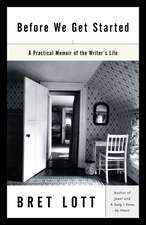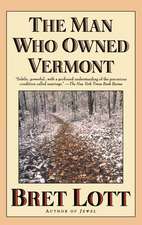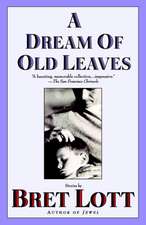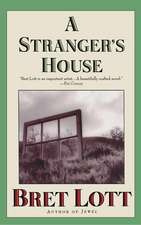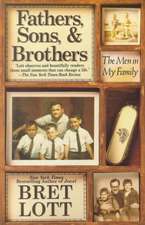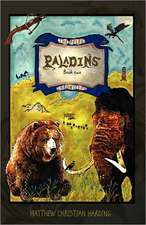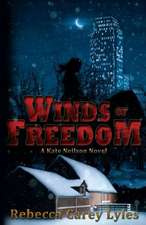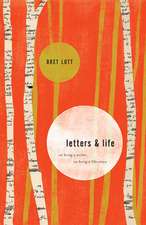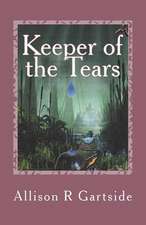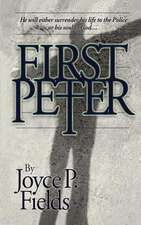A Song I Knew by Heart
Autor Bret Lotten Limba Engleză Paperback – 30 iun 2005
| Toate formatele și edițiile | Preț | Express |
|---|---|---|
| Paperback (2) | 77.08 lei 3-5 săpt. | |
| BALLANTINE BOOKS – 30 apr 2005 | 77.08 lei 3-5 săpt. | |
| Nelson Word Publishing Group – 30 iun 2005 | 129.89 lei 17-23 zile | +12.06 lei 10-14 zile |
Preț: 129.89 lei
Nou
Puncte Express: 195
Preț estimativ în valută:
24.85€ • 26.02$ • 20.57£
24.85€ • 26.02$ • 20.57£
Carte disponibilă
Livrare economică 11-17 martie
Livrare express 04-08 martie pentru 22.05 lei
Preluare comenzi: 021 569.72.76
Specificații
ISBN-13: 9781595540508
ISBN-10: 1595540504
Pagini: 336
Dimensiuni: 139 x 216 x 23 mm
Greutate: 0.48 kg
Editura: Nelson Word Publishing Group
Locul publicării:United States
ISBN-10: 1595540504
Pagini: 336
Dimensiuni: 139 x 216 x 23 mm
Greutate: 0.48 kg
Editura: Nelson Word Publishing Group
Locul publicării:United States
Extras
Chapter 1
I stood outside my son Mahlon and his wife Ruth’s bedroom door, in my hands two coffee cups, the pain sharp shards in my old fingers looped through the handles. I had on my pale blue bathrobe and slippers, my hair still in a net. I’d had it done just yesterday morning, before the funeral, and though I wore a net every night, funeral or no, there came to me last night as I slipped it on and settled into bed that somehow this was wrong. That worrying over my hair enough to put it in a net might somehow be a sin, this vanity.
But I put the net on, like every night, because it was what I’d done every night. It was my life, the way I lived it. Who I was.
A widow who lived with her son and daughter-in-law.
Eight years I’d been there with Mahlon and Ruth. Eight years since my husband Eli passed, and our old house out on 116 had revealed itself to be too big to live in. Just too big once Eli was gone, though the space he took up was no more than any other a man might take.
Because it was the love we had for each other filled that house. Love, one for the other. Then he was gone, me left behind to wander through our rooms, the house emptied of love with the last breath my husband gave out.
Now here I was, with coffee for two at Ruth and Mahlon’s door. Up and breathing like every morning, but bringing coffee upstairs. Not sitting downstairs to my kitchen table, where until four days ago there’d been three cups poured and waiting, breakfast on the way.
Because now my son Mahlon was gone, too.
I pushed open the door, and there lay Ruth on the bed, beneath the Wedding Ring quilt I made for her and Mahlon. Cold sunlight fell in through the window, the shade left up last night. She was still asleep, inside the sometime blessing I’d known sleep could be, though half her face was in that light, the other in shadow. Her mouth was open, eyebrows knotted, her chin high like she might be singing some cold and sad song in her dreams, a song so sad she had no choice but to keep her eyes closed to it.
A song I knew by heart.
I looked out that window. Morning sun shone down on the frosted rooftops of the houses in this Massachusetts town, where I’d lived for the last fifty-six years. The air was the thick white veil November air will be, white with itself and that light. Through it, and beyond anything I could ever hope to touch, lay the hills beyond town, gray and empty as my heart this morning.
My only child had died. Killed four days before in a trick of light itself: my Mahlon, on his way home from visiting Lonny Thompson up to Sunderland, hit a patch of black ice from a cold snap too early.
Lonny Thompson. My Eli’s best friend since their days at the submarine yards out to Portsmouth, New Hampshire, just after the war. Him the reason we’d moved here in the first place, why Eli brought me here once they were out of the service. He’d been like a father to my Mahlon after Eli was gone, and then’d been diagnosed with the cancer last April, Mahlon on his way home from visiting him.
Black ice on the roadway home. No way for Mahlon to know it was there, his headlights no help at all. Useless as this sun in through their bedroom window.
And it came to me then, a moment as deep as the sorrow I was inside. A moment as unexpected and sharp as the death of my child.
This: the memory of light.
Light, and the way when I was a girl it fell through the pine and live oak I grew up in a thousand miles south of here, the way it fell through palmetto and magnolia and water oak too. Light sifting down through the woods to spread like scattered diamonds on the ground before me as I walked to the creek. Bright broken pieces of light on the pinestraw at my feet so many perfect gifts of warmth.
All this came to me, whole and perfect and real. All of it in just the time it took to look out that window to see those empty hills, the rooftops.
My boy, my Mahlon.
Ruth woke, stirred beneath the quilt. Her eyes blinked open, blue-green eyes so clear and crystalline there was never a doubt in my mind why my Mahlon’d loved her from the minute he met her. You could see in her eyes her good heart, constant and certain. It’d been my Mahlon’s blessing to find her, to see that good heart, recognize in those eyes a heart worth holding on to. Twenty-three years they would have been married this next February.
Ruth’s eyes shuddered open to this cold room, and I saw the ugly promise of what was left to her, a promise I’d seen fulfilled every day for the last eight years of my own life: her husband was gone, and wouldn’t be back.
She blinked, blinked again, squinted at the light, her eyebrows still knotted up, her mouth still open. She quick reached from beneath the quilt to beside her, where, if God loved us all as He said He did, Mahlon should have been.
She still had on the black dress from yesterday. From the funeral. She hadn’t taken it off last night.
I knew what she was just then being given, knew the pain of that move, of a hand to the flat quilt, to the pillow gone untouched, to cold sheets. It was a move wouldn’t go away, this touching to see if any of what’d happened weren’t a dream.
It was what I’d done every night these last eight years: come awake sometime from inside the forgiveness of sleep, and reach for my Eli.
Ruth’s hand stopped when she found the empty pillow beside her, on her face the puzzlement that showed she knew it wasn’t a dream.
“Bless your heart,” I said, and moved toward the bed. Ruth blinked again, her eyes now on me and still with the startled look. Like I was no one she’d ever known.
Then her mouth finally closed, her chin set to trembling, and I knew her now better than I ever would’ve hoped.
It was grief she’d been given, the black and empty gift God gives you like it was something you were owed. It was grief she’d been given, and grief we shared.
“Naomi,” she whispered, the word only sound. She reached that hand from the quilt out to me, sat up in bed, her full in the light now.
Naomi. My name.
Now she was crying, her eyes closed again, her mouth and chin giving in to this morning’s discovery. One she’d make brand-new every morning from here to the end.
Still her hand reached for me, her shivering in her black dress. And still that empty whispered word Naomi hung before me, its own black dress. One I had to wear whether I wanted it or not.
The name of a woman whose husband had died, who knew the feel of cold sheets. The name now too of a woman whose only child was gone.
The name, I heard in the shattered heart that’d spoken it, of a woman whose life’d been poured out like water on the ground.
Ruth still held her hand out to me, and I whispered again, “Bless your heart,” though the words were just as empty as my name. Just sound, air out of me.
I went to the dresser, set the coffee cups on Mahlon’s side, next to his nametag from work, and the penholder, the spare change, and half-roll of cherry Lifesavers he dumped out of his pockets at the end of a day. What four days ago was only the clutter of a man’s daily life, but was now, I saw, bits of the failed history of my own blood.
I turned to Ruth, up on the edge of the bed now, hands in her lap. Her eyes still closed, her heart let out the broken silver sound of grief I’d heard myself give up too many nights and days, and then I was beside her, and I reached to her. I touched her hair, felt the softness of it, felt the deep chestnut beauty of it. Beauty my son’d known and felt and never would again, and in that cold moment of seeing what had been and would never be again, I took my daughter-in-law in my arms, pulled her close to me. I closed my eyes, felt her arms rise to me, move slowly to me, and we held each other.
Two widows, in each other’s arms. Another house emptied of love.
God in His heaven, and nothing right with the world.
And I had to ask again: Why call me Naomi?
Naomi was a teenage girl in a flowered cotton dress, a girl who walked summer afternoons barefoot through that broken perfect light of the woods to the creek. She was a girl who walked the pinestraw littered through the woods, a warm and prickly carpet beneath her, a girl born and raised in that South Carolina light, in a small town on a deepwater creek that led to a harbor that led to the great green sea.
And once through those woods, she was a girl who stood at the edge of the marsh that bordered the creek all bathed in unbroken light, colors all around too rich and beautiful and full of the peace of a girl’s afternoons to be believed: the greens and browns and reds of the saltmarsh hay and yellowgrass, the shiny solid black of pluff mud at low tide, the soft green and blue of the creek itself. Shattered light banged up off the water those afternoons, the sun on its way down too fast, too fast, even though these were the longest days of the year, days that seemed somehow to stretch long and slow and full of themselves until now, in the afternoon, when the day seemed to hurry itself too fast for how slow and forgetful it’d been all day long.
That was when the girl, this Naomi, watched the water, and the harbor, and the church spires of Charleston across it all reaching up like they might pierce the sky itself; that was when she watched and watched, and then finally here they came: her daddy, and his shrimp boat, the Mary Sweet, making the long turn in from the harbor and into the creek, the trawler seines pulled high beside her clean white hull like hands up in praise, she always imagined, this girl standing each afternoon on a small bluff on a deepwater creek in a South Carolina town, all of it loved by this sun, warm down on her, perfect and whole and light.
And once she saw her daddy’s boat head into the creek, she waited, waited, and then, when the Mary Sweet pulled near even with her, she waved to her daddy high in the cabin, there at the wheel, her daddy always putting on surprise she was there—his mouth open, eyebrows high, head quick turned to her like he hadn’t seen her from a half mile out—then letting one sharp hoot from the horn, a signal to her he’d seen her, and to her momma a mile away back to the house that they’d made it in, he’d be home before long.
This was Naomi: a girl blessed with a momma and daddy, a creek to walk to, pinestraw to feel beneath her feet, the pine smell up off it a blessing too, all of it dressed in colors so full there was no need to name them or think on them. Colors it was enough just to look at to have them live in you.
She was a girl, too, blessed once more and forever, though she could not know it those afternoons in summer light so sweet she could taste it on her tongue: once her daddy’d turned his attention to the docks a quarter mile up creek where he’d raft up the Mary Sweet to the other trawlers, this Naomi was a girl who turned her own eyes to the stern of the boat, and to the boy in blue jeans and black rubber boots on the deck back there, hands on his hips, his shirt off and skin brown for this peaceful sun, his hair a kind of sun-drenched brown made light for that sun, his eyes squinted near shut for that sunlight too, him watching her.
Eli. The boy who’d sat behind her three years running at Mount Pleasant Academy. The boy she’d been baptized in the ocean with summer before last, a good twenty or thirty kids saved one night at a revival out to Sullivan’s Island.
The teenage boy her daddy’d had to hire to do the best he could to replace her older brother, off to the war.
Eli. The boy she loved.
Naomi was a girl who gave him the smallest of waves, the boy, her Eli, giving one back, a hand up from his hip and waving just once and then smiling before heading to the bow to ready the lines he would cast to raft them up.
And though she could not know it then, his was a smile she would carry with her the rest of her days, and though she could not know it too their hands raised to each other was a pact sealed all the way back then, made with no true notion in their hearts they were making it, but making it all the same: you have my heart.
Naomi. A girl who turned each afternoon from all this, from the whole of her life laid out before her and ready to be lived, and headed back into those woods toward home, where she and Daddy and Momma, and best of all her Eli, would be having supper soon.
That was Naomi.
I stood outside my son Mahlon and his wife Ruth’s bedroom door, in my hands two coffee cups, the pain sharp shards in my old fingers looped through the handles. I had on my pale blue bathrobe and slippers, my hair still in a net. I’d had it done just yesterday morning, before the funeral, and though I wore a net every night, funeral or no, there came to me last night as I slipped it on and settled into bed that somehow this was wrong. That worrying over my hair enough to put it in a net might somehow be a sin, this vanity.
But I put the net on, like every night, because it was what I’d done every night. It was my life, the way I lived it. Who I was.
A widow who lived with her son and daughter-in-law.
Eight years I’d been there with Mahlon and Ruth. Eight years since my husband Eli passed, and our old house out on 116 had revealed itself to be too big to live in. Just too big once Eli was gone, though the space he took up was no more than any other a man might take.
Because it was the love we had for each other filled that house. Love, one for the other. Then he was gone, me left behind to wander through our rooms, the house emptied of love with the last breath my husband gave out.
Now here I was, with coffee for two at Ruth and Mahlon’s door. Up and breathing like every morning, but bringing coffee upstairs. Not sitting downstairs to my kitchen table, where until four days ago there’d been three cups poured and waiting, breakfast on the way.
Because now my son Mahlon was gone, too.
I pushed open the door, and there lay Ruth on the bed, beneath the Wedding Ring quilt I made for her and Mahlon. Cold sunlight fell in through the window, the shade left up last night. She was still asleep, inside the sometime blessing I’d known sleep could be, though half her face was in that light, the other in shadow. Her mouth was open, eyebrows knotted, her chin high like she might be singing some cold and sad song in her dreams, a song so sad she had no choice but to keep her eyes closed to it.
A song I knew by heart.
I looked out that window. Morning sun shone down on the frosted rooftops of the houses in this Massachusetts town, where I’d lived for the last fifty-six years. The air was the thick white veil November air will be, white with itself and that light. Through it, and beyond anything I could ever hope to touch, lay the hills beyond town, gray and empty as my heart this morning.
My only child had died. Killed four days before in a trick of light itself: my Mahlon, on his way home from visiting Lonny Thompson up to Sunderland, hit a patch of black ice from a cold snap too early.
Lonny Thompson. My Eli’s best friend since their days at the submarine yards out to Portsmouth, New Hampshire, just after the war. Him the reason we’d moved here in the first place, why Eli brought me here once they were out of the service. He’d been like a father to my Mahlon after Eli was gone, and then’d been diagnosed with the cancer last April, Mahlon on his way home from visiting him.
Black ice on the roadway home. No way for Mahlon to know it was there, his headlights no help at all. Useless as this sun in through their bedroom window.
And it came to me then, a moment as deep as the sorrow I was inside. A moment as unexpected and sharp as the death of my child.
This: the memory of light.
Light, and the way when I was a girl it fell through the pine and live oak I grew up in a thousand miles south of here, the way it fell through palmetto and magnolia and water oak too. Light sifting down through the woods to spread like scattered diamonds on the ground before me as I walked to the creek. Bright broken pieces of light on the pinestraw at my feet so many perfect gifts of warmth.
All this came to me, whole and perfect and real. All of it in just the time it took to look out that window to see those empty hills, the rooftops.
My boy, my Mahlon.
Ruth woke, stirred beneath the quilt. Her eyes blinked open, blue-green eyes so clear and crystalline there was never a doubt in my mind why my Mahlon’d loved her from the minute he met her. You could see in her eyes her good heart, constant and certain. It’d been my Mahlon’s blessing to find her, to see that good heart, recognize in those eyes a heart worth holding on to. Twenty-three years they would have been married this next February.
Ruth’s eyes shuddered open to this cold room, and I saw the ugly promise of what was left to her, a promise I’d seen fulfilled every day for the last eight years of my own life: her husband was gone, and wouldn’t be back.
She blinked, blinked again, squinted at the light, her eyebrows still knotted up, her mouth still open. She quick reached from beneath the quilt to beside her, where, if God loved us all as He said He did, Mahlon should have been.
She still had on the black dress from yesterday. From the funeral. She hadn’t taken it off last night.
I knew what she was just then being given, knew the pain of that move, of a hand to the flat quilt, to the pillow gone untouched, to cold sheets. It was a move wouldn’t go away, this touching to see if any of what’d happened weren’t a dream.
It was what I’d done every night these last eight years: come awake sometime from inside the forgiveness of sleep, and reach for my Eli.
Ruth’s hand stopped when she found the empty pillow beside her, on her face the puzzlement that showed she knew it wasn’t a dream.
“Bless your heart,” I said, and moved toward the bed. Ruth blinked again, her eyes now on me and still with the startled look. Like I was no one she’d ever known.
Then her mouth finally closed, her chin set to trembling, and I knew her now better than I ever would’ve hoped.
It was grief she’d been given, the black and empty gift God gives you like it was something you were owed. It was grief she’d been given, and grief we shared.
“Naomi,” she whispered, the word only sound. She reached that hand from the quilt out to me, sat up in bed, her full in the light now.
Naomi. My name.
Now she was crying, her eyes closed again, her mouth and chin giving in to this morning’s discovery. One she’d make brand-new every morning from here to the end.
Still her hand reached for me, her shivering in her black dress. And still that empty whispered word Naomi hung before me, its own black dress. One I had to wear whether I wanted it or not.
The name of a woman whose husband had died, who knew the feel of cold sheets. The name now too of a woman whose only child was gone.
The name, I heard in the shattered heart that’d spoken it, of a woman whose life’d been poured out like water on the ground.
Ruth still held her hand out to me, and I whispered again, “Bless your heart,” though the words were just as empty as my name. Just sound, air out of me.
I went to the dresser, set the coffee cups on Mahlon’s side, next to his nametag from work, and the penholder, the spare change, and half-roll of cherry Lifesavers he dumped out of his pockets at the end of a day. What four days ago was only the clutter of a man’s daily life, but was now, I saw, bits of the failed history of my own blood.
I turned to Ruth, up on the edge of the bed now, hands in her lap. Her eyes still closed, her heart let out the broken silver sound of grief I’d heard myself give up too many nights and days, and then I was beside her, and I reached to her. I touched her hair, felt the softness of it, felt the deep chestnut beauty of it. Beauty my son’d known and felt and never would again, and in that cold moment of seeing what had been and would never be again, I took my daughter-in-law in my arms, pulled her close to me. I closed my eyes, felt her arms rise to me, move slowly to me, and we held each other.
Two widows, in each other’s arms. Another house emptied of love.
God in His heaven, and nothing right with the world.
And I had to ask again: Why call me Naomi?
Naomi was a teenage girl in a flowered cotton dress, a girl who walked summer afternoons barefoot through that broken perfect light of the woods to the creek. She was a girl who walked the pinestraw littered through the woods, a warm and prickly carpet beneath her, a girl born and raised in that South Carolina light, in a small town on a deepwater creek that led to a harbor that led to the great green sea.
And once through those woods, she was a girl who stood at the edge of the marsh that bordered the creek all bathed in unbroken light, colors all around too rich and beautiful and full of the peace of a girl’s afternoons to be believed: the greens and browns and reds of the saltmarsh hay and yellowgrass, the shiny solid black of pluff mud at low tide, the soft green and blue of the creek itself. Shattered light banged up off the water those afternoons, the sun on its way down too fast, too fast, even though these were the longest days of the year, days that seemed somehow to stretch long and slow and full of themselves until now, in the afternoon, when the day seemed to hurry itself too fast for how slow and forgetful it’d been all day long.
That was when the girl, this Naomi, watched the water, and the harbor, and the church spires of Charleston across it all reaching up like they might pierce the sky itself; that was when she watched and watched, and then finally here they came: her daddy, and his shrimp boat, the Mary Sweet, making the long turn in from the harbor and into the creek, the trawler seines pulled high beside her clean white hull like hands up in praise, she always imagined, this girl standing each afternoon on a small bluff on a deepwater creek in a South Carolina town, all of it loved by this sun, warm down on her, perfect and whole and light.
And once she saw her daddy’s boat head into the creek, she waited, waited, and then, when the Mary Sweet pulled near even with her, she waved to her daddy high in the cabin, there at the wheel, her daddy always putting on surprise she was there—his mouth open, eyebrows high, head quick turned to her like he hadn’t seen her from a half mile out—then letting one sharp hoot from the horn, a signal to her he’d seen her, and to her momma a mile away back to the house that they’d made it in, he’d be home before long.
This was Naomi: a girl blessed with a momma and daddy, a creek to walk to, pinestraw to feel beneath her feet, the pine smell up off it a blessing too, all of it dressed in colors so full there was no need to name them or think on them. Colors it was enough just to look at to have them live in you.
She was a girl, too, blessed once more and forever, though she could not know it those afternoons in summer light so sweet she could taste it on her tongue: once her daddy’d turned his attention to the docks a quarter mile up creek where he’d raft up the Mary Sweet to the other trawlers, this Naomi was a girl who turned her own eyes to the stern of the boat, and to the boy in blue jeans and black rubber boots on the deck back there, hands on his hips, his shirt off and skin brown for this peaceful sun, his hair a kind of sun-drenched brown made light for that sun, his eyes squinted near shut for that sunlight too, him watching her.
Eli. The boy who’d sat behind her three years running at Mount Pleasant Academy. The boy she’d been baptized in the ocean with summer before last, a good twenty or thirty kids saved one night at a revival out to Sullivan’s Island.
The teenage boy her daddy’d had to hire to do the best he could to replace her older brother, off to the war.
Eli. The boy she loved.
Naomi was a girl who gave him the smallest of waves, the boy, her Eli, giving one back, a hand up from his hip and waving just once and then smiling before heading to the bow to ready the lines he would cast to raft them up.
And though she could not know it then, his was a smile she would carry with her the rest of her days, and though she could not know it too their hands raised to each other was a pact sealed all the way back then, made with no true notion in their hearts they were making it, but making it all the same: you have my heart.
Naomi. A girl who turned each afternoon from all this, from the whole of her life laid out before her and ready to be lived, and headed back into those woods toward home, where she and Daddy and Momma, and best of all her Eli, would be having supper soon.
That was Naomi.
Recenzii
“An affecting novel about the slow workings of forgiveness and redemption.”
–MAUREEN CORRIGAN, National Public Radio
“Written in lyrical rhythms . . . an affecting hymn to family love and a mantra of empathy and forgiveness.”
–Richmond Times-Dispatch
“We can only admire the way Lott . . . creates and differentiates so many characters and sets them into action so naturally. . . . A chance to visit a country of grace where the twisted roads of American literature seldom lead us.”
–Los Angeles Times Book Review
“Lott uses lyrical, poetic language and addresses moral principles that force the reader to stop for self-reflection. . . . A moving story.”
–Tulsa World
“Vividly intense, intimately detailed . . . a memorable book.”
–The Sunday Oklahoman
–MAUREEN CORRIGAN, National Public Radio
“Written in lyrical rhythms . . . an affecting hymn to family love and a mantra of empathy and forgiveness.”
–Richmond Times-Dispatch
“We can only admire the way Lott . . . creates and differentiates so many characters and sets them into action so naturally. . . . A chance to visit a country of grace where the twisted roads of American literature seldom lead us.”
–Los Angeles Times Book Review
“Lott uses lyrical, poetic language and addresses moral principles that force the reader to stop for self-reflection. . . . A moving story.”
–Tulsa World
“Vividly intense, intimately detailed . . . a memorable book.”
–The Sunday Oklahoman
Descriere
Descriere de la o altă ediție sau format:
Inspired by the Biblical story from the book of Ruth, this novel is a beautiful exploration of the power of love and family, of the ravages of grief and regret, and of the strength of the mother-daughter bond.
Inspired by the Biblical story from the book of Ruth, this novel is a beautiful exploration of the power of love and family, of the ravages of grief and regret, and of the strength of the mother-daughter bond.
Notă biografică
Bret Lott is the bestselling author of twelve books, including the novels Ancient Highway, The Hunt Club, A Song I Knew by Heart, and Jewel (an Oprah’s Book Club selection). Formerly editor of The Southern Review, Lott was appointed to the National Council on the Arts in 2006. He Lives with his wife, Melanie, in Hanahan, South Carolina, and teaches at the College of Charleston.


